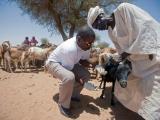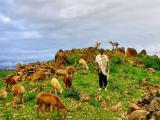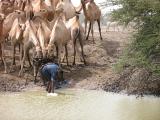A total of 404 Rift Valley fever (RVF) cases, including 42 deaths, have been confirmed in Senegal and Mauritania from September 20 to October 30, the World Health Organization (WHO) said in an update yesterday.
"The majority of human infections result from contact with the blood or organs of infected animals, but human infections have also resulted from the bites of infected mosquitoes. To date, no human-to-human transmission of RVF has been documented," the WHO said.
In animals, RVF is always severe, but in people infections can range from mild flu-like illness to hemorrhagic fevers that can be fatal.
High death rate in Mauritania
All but 46 of the confirmed cases have been in Senegal, the WHO said. But among Mauritania's 46 confirmed cases are 14 deaths, indicating a high case-fatality rate (CFR) in that country of 30%.
The Mauritanian Ministry of Animal Resources reported 62 animal outbreaks, with sheep, camels, and goats the most infected. The first animal cases were reported in August.
"RVF is endemic in Mauritania. The last major outbreak occurred in 2022, with 47 confirmed human cases, including 23 deaths (case fatality ratio 49%)," the WHO said.
The CFR in Senegal is much lower, at 7.8%, representing 28 deaths among 358 confirmed human cases. RVF is also endemic in Senegal, with the last human case in January 2025, and a total of 160 confirmed animal cases of RVF in sheep, goats and cattle in seven regions this year.
The situation is particularly concerning in Mauritania, where the case fatality rate has reached 30%, indicating heightened severity.
"In Senegal, approximately 11% of confirmed human cases have presented with hemorrhagic symptoms, of which 20 have resulted in death. The situation is particularly concerning in Mauritania, where the case fatality rate has reached 30%, indicating heightened severity," the WHO said.
Risk of more cases remains high
The WHO said the risk of more cases this year remains high, because of environmental conditions favorable to mosquitoes, as well as movements of livestock within country and towards Mali and Gambia for grazing and trade.
"The current outbreak of RVF in Senegal and Mauritania is unusual in its scale and severity," the WHO said. "A high proportion of severe human cases have been reported, potentially reflecting gaps in case detection and limitation in optimized clinical management."
Tackling these outbreaks will require a One Health approach, the WHO said. The WHO emphasized mosquito control; avoiding unsafe consumption of fresh blood, raw milk, or animal tissue; and safe livestock handling and slaughter practices.
















